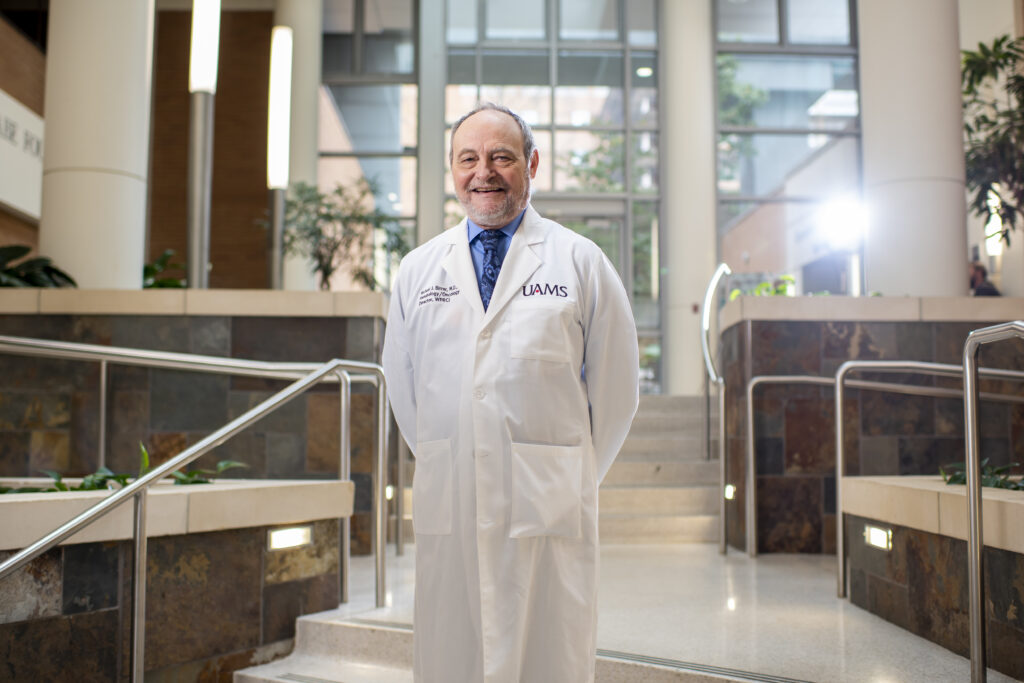
There’s never been a more exciting time of growth for our research and clinical programs. Thanks to overwhelming support from Gov. Sarah Huckabee Sanders, the Arkansas Legislature, UAMS Chancellor Cam Patterson and our many friends across the state, we are well on the way to becoming Arkansas’ first and only cancer center designated by the National Cancer Institute.
This important and prestigious designation will place the Cancer Institute among the top 2% of cancer centers in the country, as well as give our patients access to the latest clinical trials and our scientists the ability to receive significant grant funding.
Our research programs are growing rapidly. Our dedicated scientists are committed to expanding our already successful lab- and community-based programs and adding new, innovative initiatives. We have also established the Office of Community Outreach and Engagement, which is doing great things to reach our rural communities and ensure all Arkansans have access to cancer care without barriers.
Our clinical expertise also continues to expand, as we recently became the only facility in Arkansas approved to provide proton therapy. Advances such as this are vital to the future of cancer care, and we vow to remain on the forefront of innovative cancer care for all Arkansans.
The future is exciting for the UAMS Winthrop P. Rockefeller Cancer Institute. More importantly, the future is bright for the entire cancer community in Arkansas as new therapies are developed and lives are saved. I invite you to join us in this journey.
Michael Birrer, M.D., Ph.D.
Vice Chancellor, UAMS
Director, Winthrop P. Rockefeller Cancer Institute
About Michael Birrer, M.D., Ph.D.
Dr. Birrer earned his undergraduate degree at Rensselaer Polytechnic Institute and graduated with a B.S. in Biology. He subsequently was accepted into the Medical Scientist Training Program at the Albert Einstein College of Medicine and completed his M.D. and Ph.D. in 1982 with his principal area of study in microbiology and immunology. He performed a medical internship and residency at the Massachusetts General Hospital. Dr. Birrer entered the medical oncology fellowship at the National Cancer Institute in Bethesda, Maryland, and upon completion performed a postdoctoral fellowship in the laboratory of Dr. John Minna on the molecular genetics of lung cancer. After completing his fellowship, Dr. Birrer joined the faculty at the NCI in the Division of Cancer Treatment as an investigator in 1988. Three years later, Dr. Birrer was appointed as a senior investigator (with tenure) and established the molecular mechanism section in the Division of Cancer Prevention and Control. Over the next 17 years, Dr. Birrer held a number of positions including the Committee for the Protection of Human Subjects, Gynecologic Oncology Tumor Board, Extramural IRB, Clinical Oncology Fellowship Section Committee, Chair of the Gynecologic Oncology Working Group in the Division of Clinical Sciences and Deputy Branch Chief of the Cell and Cancer Biology Branch.
Dr. Birrer is recognized nationally and internationally as an expert in gynecologic oncology. He has published over 400 peer-reviewed manuscripts and another 30 book chapters and review articles. He has served in leadership positions within the greater gynecologic oncology community. He has been the Chair and Chair Emeritus of the Department of Defense Ovarian Cancer Research Program, Chair of the Committee for Experimental Medicine of the Gynecologic Oncology Group, Chair of the Gynecologic Cancer Steering Committee and Chair of the Translational Science Working Group of the Gynecologic Cancer Intergroup. Dr. Birrer has been a member of the Society of Gynecologic Oncology, American Society of Clinical Oncologists, American Association of Cancer Research and the International Gynecologic Cancer Society. He has been on the program committees of ASCO, SGO and IGCS.

In November 2008, Dr. Birrer was appointed Professor of Medicine at the Harvard School of Medicine. Dr. Birrer assumed the position of Director of Gynecologic Medical Oncology at Mass General Hospital and the Gynecologic Oncology Research Program at the Dana Faber/Harvard Cancer Center. This program integrated important new discoveries in translational research into clinical trials. Under his leadership, the DF/HCC Gynecologic Cancer Program grew to encompass over 200 active trials, approximately 250 patient accruals on clinical trials, membership which extended to all seven DF/HCC participating institutions and over 12 million dollars in NCI grants.
In August 2017, Dr. Birrer accepted the position of Director of the Comprehensive Cancer Center at the University of Alabama at Birmingham (UAB). While there, he was a Professor of Medicine, Pathology, and Obstetrics and Gynecology, and the recipient of the Evalina B. Spencer Chair in Oncology. During his tenure, Dr. Birrer raised over 40 million dollars in philanthropic funds including a 30 million dollar gift to name the cancer center. This was the first time in 46 years of its existence that the cancer center was named – the O’Neal Cancer Center. In addition, during this time he designed and open the first cancer service line at UAB.
In December 2019, Dr. Birrer accepted the position of University of Arkansas for Medical Sciences Vice Chancellor and Director of the Winthrop P. Rockefeller Cancer Institute. This is the only academic-based cancer center in the state of Arkansas, serves the entire state, and has 90 members from multiple different departments. Dr. Birrer is also Director of the Cancer Service Line, which has 500 members serving all aspects of cancer care.
